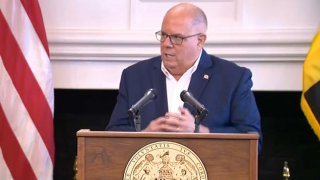
Maryland Gov. Larry Hogan highlighted preliminary budget recommendations Thursday for the incoming administration of Gov.-elect Wes Moore at a time when the state has a big budget surplus.
Largely due to enormous federal aid during the pandemic, Maryland has an estimated $2.5 billion budget surplus heading toward the next fiscal year. The state also is set to have an unusually large amount in its Rainy Day Fund: roughly $3 billion, or about 12% of the state's general fund.
Hogan, who prioritized fiscal responsibility throughout his tenure, urged the incoming administration and lawmakers to maintain a sizable surplus. The term-limited Republican also urged lawmakers in the General Assembly, which is controlled by Democrats, to leave the big pot of reserves in the Rainy Day Fund intact, even as the legislature is acquiring new budget powers in the upcoming legislative session.
“With continued inflation and economic uncertainty at the national level, we believe this is critically important, and it would be a mistake for the legislature to use its newly expanded budgetary power to return to the old habits of raiding the Rainy Day Fund or recklessly spending down the surplus," Hogan said at a news conference.
We're making it easier for you to find stories that matter with our new newsletter — The 4Front. Sign up here and get news that is important for you to your inbox.
The new budget powers for the legislature were approved by voters in a constitutional amendment in 2020. Previously, Maryland's governor had unusually strong budget authority in the Maryland Constitution, because the legislature was only allowed to cut from the governor's plan. In the upcoming legislative session, which begins Jan. 13, lawmakers will be able to increase, decrease or add items to the budget, as long as the changes don’t exceed the total proposed by the governor.
Meanwhile, a panel of lawmakers that makes fiscal recommendations acknowledged the need for the state to bolster available resources due to the potential for an economic downturn. The Spending Affordability Committee voted to recommend the state keep a minimum fund balance of $350 million for the next fiscal year, the largest the panel has recommended in years. It also recommended maintaining a rainy day fund balance of 10% of general fund revenues, an unusually high amount.
The panel also is recommending making investments in education, as well as state services that have been overlooked and underfunded in recent years. This includes investments in the state workforce, expanding availability of behavioral health services and some one-time investments in transportation infrastructure.
Local
Washington, D.C., Maryland and Virginia local news, events and information
Senate President Bill Ferguson, a Baltimore Democrat, noted after the committee's vote that the state has maintained its Triple-A bond rating, which he described as “an unequivocal acknowledgement by fiscal experts that the budgets enacted by the General Assembly are fiscally responsible.”
“In the Legislature, we know how to be pragmatic, and we know how to spend responsibly while balancing our state's most essential needs,” Ferguson said.
Hogan also is recommending $500 million to help recruit and retain police officers, expand community policing efforts, improve training and teach better de-escalation techniques.
Hogan also is proposing $100 million to replace an aging hospital in Easton on the Eastern Shore, with a new 230-acre University of Maryland Regional Medical Center.
Hogan also announced plans for a $100 million commitment to expand behavioral health services at Sheppard Pratt, including expanded capacity at its new Elkridge campus and a new dedicated children’s hospital in Towson.
The governor said the budget proposal includes $10 million for Meritus Health's plan to construct a new School of Osteopathic Medicine in Hagerstown, as well as $10 million for Kennedy Krieger’s plan to build a new Innovative Care Center on its East Baltimore campus.
Hogan’s budget team has been working with the incoming administration on the budget for the next fiscal year. Moore, a Democrat, will submit the budget plan to the General Assembly on Jan. 20, two days after he takes office.
Brian Jones, a spokesperson for Moore's transition team, said the incoming administration appreciates Hogan's suggestions and will continue to work with his administration on the transition. He said the incoming administration's final budget proposal will reflect Moore's “vision and priorities to move Maryland forward with bold and disciplined investments in transportation, strengthening our competitiveness, and providing Marylanders with a world-class education.”
After Moore proposes the budget next month, the General Assembly will work on the state spending plan in their 90-day session.



